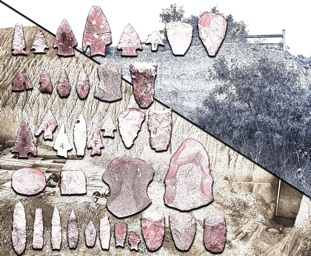
During the digging of the dam for the voter-rejected Applewhite Reservoir, one man--Richard Beene--stepped off his earth-moving machine and discovered archeological artifacts dating back many, many millennia. “The bellyscrapers were scraping by and they were sixteen feet beneath the surface and he [Richard Beene] saw all over the ground the remains of these campfires and the remains of these mussel shells,” recalls Texas A&M archeologist Alston Thoms, who was working nearby on the property in 1990 when Beene raised the alarm. “Had he waited fifteen minutes, at the rate those bellyscrapers were going, [the evidence] would have been gone.” As a result of his find, this place would become known to archeologists as “the Richard Beene Site.”
In early 1990 Texas A&M archeologists recorded the Richard Beene Site, then known only as 41BX831. In all, twenty distinct archeological layers were excavated at the site yielding over forty radiocarbon ages. This makes the Richard Beene Site one of only a handful of sites on the entire U.S. Gulf Coastal Plain to yield a nearly complete record of occupation spanning the last 10,000 years. The Richard Beene Site was among only fifteen sites determined eligible for inclusion on the National Register of Historic Places and for official designation as State Archeological Landmarks.
This site provides an unusually complete record of the region’s cultural and natural history with an abundance of projectile points, evidence of grinding slabs for the processing of plants, sandstone earth ovens, stone knives and an extensive, well-preserved campsite.
Evidence and artifacts at the Richard Beene Site are telling signs of the ways in which life changed for the people who called the site and the surrounding area home throughout the last 10,000 years. The goal of the LHI foundation is to preserve these archaeologically rich sites for future generations to learn about Texas history and culture by opening the property for use by colleges and universities to continue archeological research.

